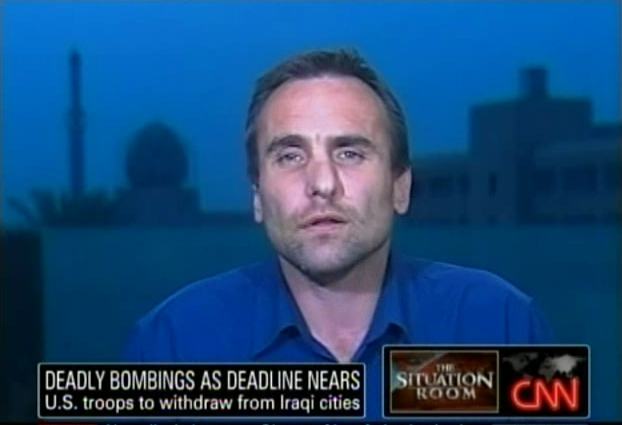TSR: "Let's not think that just because Iraq had slipped off the public radar, that people weren't dying here all this year. They were."
June 27, 2009

Length: 3:06
LARGE (35.9 MB) ----- SMALL (3.8 MB)
Wolf Blitzer asks Michael what we should expect come Wednesday morning. Recorded Friday (looks to be around 7pm in Baghdad).
WOLF BLITZER: A bloody wave of violence is washing over Iraq with scores of people across the country killed in a series of gruesome bombings this past week. And it all comes only days before U.S. forces are scheduled to withdraw from all major Iraqi cities.
Let's go to Baghdad, CNN's Michael Ware, is standing by. The deadline is Tuesday for U.S. combat forces to leave the cities. Michael, what's likely to happen?
MICHAEL WARE: Well, on the morning of July 1st, not a great deal to be honest, Wolf. This withdrawal has been going on since January. Now you're still going to see some odd Americans out on the streets. You're going to have U.S. advisers embedded with Iraqi units. You'll still see them occasionally. There's going to be some partnered operations. There's some partnered patrols, some joint events. But by and large, you're not going to see the presence of U.S. forces that we've become so accustomed to.
Because as you point out, as of Tuesday, all U.S. forces by then have to have had retreated to predesignated bases. They're allowed to operate in the green belt around Baghdad. They're allowed to run around in the desert, but they're not allowed in the cities or the townships without the true commanders of the Iraq War as of Tuesday: the Iraqis. Wolf.
BLITZER: Why has there been, at least it seems like there's been an upsurge in violence, deadly violence over the past week or two?
WARE: Well, it all comes within, you know, the breadth of a longer running campaign. I mean, let's not think that just because Iraq had slipped off the public radar, that people weren't dying here all this year. They were.
There's a broader bombing campaign trying to reignite the bloodbath of the sectarian civil war. But in the past week from bombings, mortar attacks, shootings, roadside explosions, at least 210 Iraqi civilians have been slaughtered. And many of them, I regret to report, are women and children because a lot of these blasts, a lot of these attacks are in marketplaces.
This is ratcheting up the pressure. Not so much on the Americans. There's no questions about the Americans coming back into the streets, not unless this Iraqi government which has been hardlined, does a 180 and invites them. America is out of the decision-making process. The American-led war will be over as of Tuesday.
The real point I think here is to put pressure on the Iraqi government. The prime minister here staked his claim. He has said that "I will stop the violence." He had success in Basra, some limited success in Sadr City last year. However, if this continues, it's he who will suffer at the ballot box next January, according to most diplomats and analysts here on the ground. Wolf?
BLITZER: Michael Ware, be careful over in Baghdad. We'll check in with you throughout the week. Michael Ware is reporting for us.
